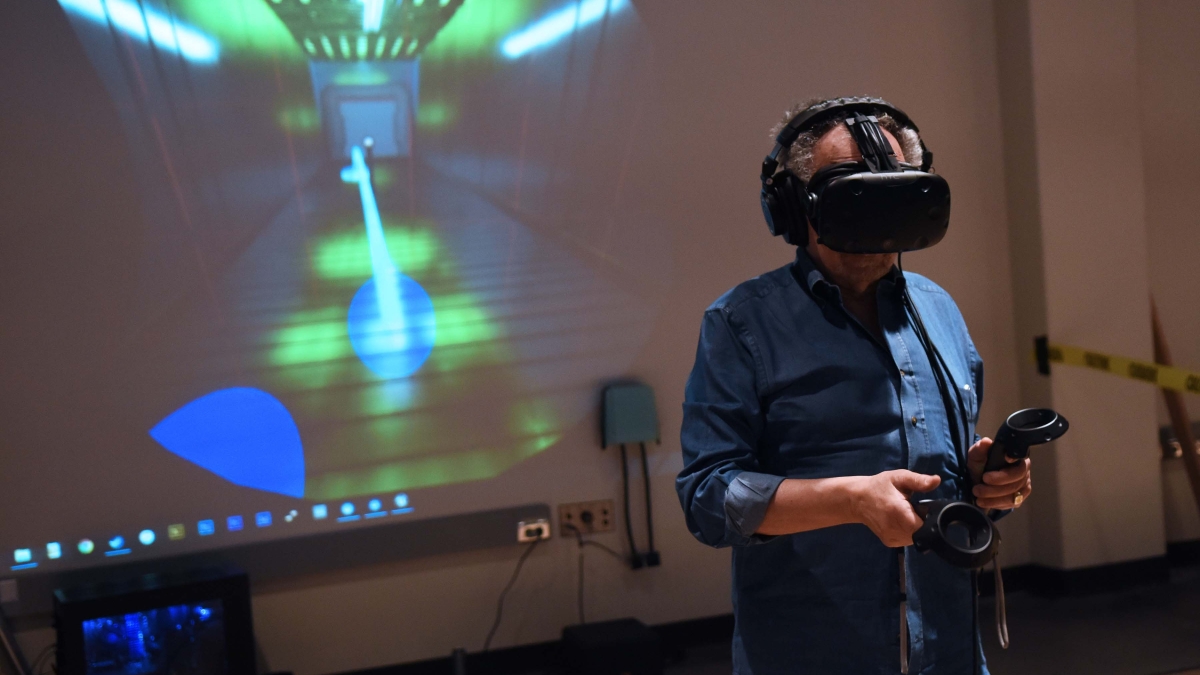ASU digital culture graduate lands dream job

Andre Maestas' 2017 VR capstone project being played with (Photo credit: Tim Trumble)
Digital culture graduate Andre Maestas landed her dream job as a software test engineer at Unity Technologies, a video game software development company.
Maestas graduated from Arizona State University's School of Arts, Media and Engineering’s digital culture undergraduate program in May 2017 with a focus in graphic information technologies. During her time in digital culture, she took a strong interest in virtual and augmented reality systems and decided to continue pursuing work in the field as part of her final capstone.
While at the school, Maestas was offered a position in Associate Professor Garth Paine’s Acoustic Ecology Lab working on multiple VR projects made in Unity and focused on making an impact on the world. Her work centered around the EcoRift project, which concentrated on connecting people to the environment and allowing users to experience national parks and various places around the world.
Until recently she was working as a data software test engineer for Experis Game Solutions in Tempe, Arizona. At Experis, Maestas worked as a contractor for Microsoft Studios Quality, a quality assurance organization under the Xbox brand, and spent her time testing several games published by Microsoft. She recently moved to Seattle and begins her new job at Unity this week. She credits her time at ASU for helping her land the job, saying the opportunities at ASU helped her to harness skills in the area of VR/AR systems within Unity.
“I want to thank everyone at (the School of Arts, Media and Engineering),” Maestas said. “There are so many amazing people doing amazing things there. The wide variety of things I learned in the (digital culture) program really taught me how to learn and apply creative thinking to creation and engineering.”
She said even when studying a topic in classes she didn’t think were going to be interesting by the time the section was over, she had been drawn in and found the topics engaging.
“It's that kind of variety that's opened doors and my mind to so many creative disciplines,” she said. “I feel it really fed my desire to be creative and to learn new things in an efficient manner. I learned about music and art and dance and engineering and technology. This prepared me not only to do a job or work [with] just one thing but fully how to create and learn and explore.”
Question: Why did you choose the School of Arts, Media and Engineering?
Answer: I was interested in the interdisciplinary nature of the program. I researched a few programs and found AME and was very interested in the courses. When I originally applied to the program my major was called digital culture (tech entrepreneurship). I loved how I could take TEM (technological entrepreneurship management) classes in addition to (digital culture) classes for the concentration. I was always interested in the business of tech, and I felt it would give me additional value and help me one day start my own business. I also took GIT (graphics information technology) courses. The name of my major concentration was changed about halfway through my time at AME.
Q: How did digital culture prepare you for your career?
A: Digital culture is a very dynamic program. I feel it provides a very broad range of skills. Most of all this format really taught me how to learn. The courses cover such a wide range of topics that it forces you to be just as dynamic and creative.
Q: Describe a day on the job.
A: As a data software test engineer my role was kind of hybridized. I owned specific areas of the titles we were testing. I would write test plans on how we would organize testing on my areas. I mostly owned telemetry (data collected from the game, which tracks what's happening) and our tools and technology used to do the testing. On a normal day I would work on creating tools which would streamline our testing processes, manage a pool of test associates who execute test cases and work on playing the game and writing bugs. I also worked closely with the developers and our partners at Microsoft to help navigate and improve the development process from a quality and data perspective.
More Science and technology

Compact X-ray laser lab aims to reveal deep secrets of life, matter and energy
X-rays allow us to view inside the human body to diagnose broken bones and other hidden problems. More recent X-ray advances are…

Apollo lunar samples enable ASU researcher to pinpoint moon’s crystallization timeline
A team of researchers, including Arizona State University geochemist Melanie Barboni, in collaboration with scientists from The…

NASA launches space telescope to chart the sky and millions of galaxies
California’s Vandenberg Space Force Base was the site for Tuesday’s 8:10 p.m. launch of the NASA SPHEREx mission aboard a SpaceX…

